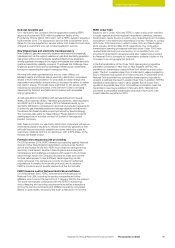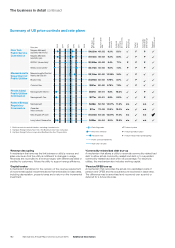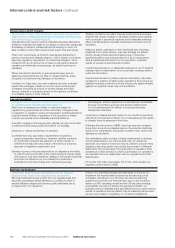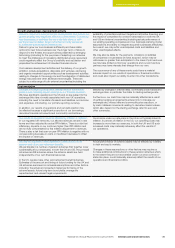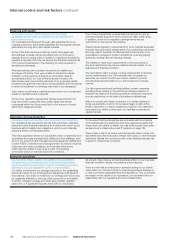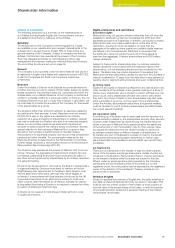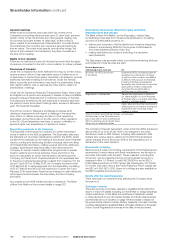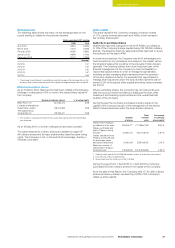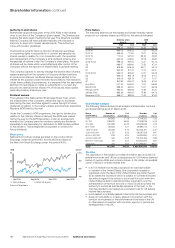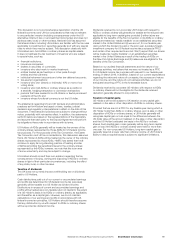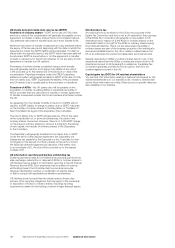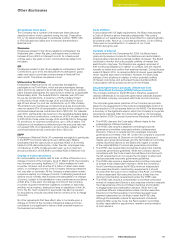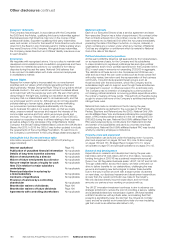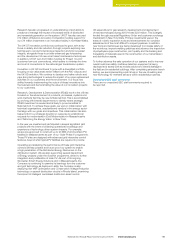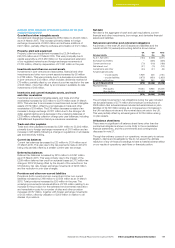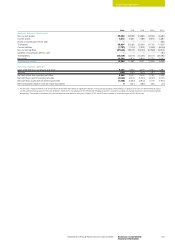National Grid 2016 Annual Report Download - page 193
Download and view the complete annual report
Please find page 193 of the 2016 National Grid annual report below. You can navigate through the pages in the report by either clicking on the pages listed below, or by using the keyword search tool below to find specific information within the annual report.
This discussion is not a comprehensive description of all the US
federal income tax and UK tax considerations that may be relevant
to any particular investor (including consequences under the US
alternative minimum tax or net investment income tax) and does not
address state, local, or other tax laws. National Grid has assumed
that shareholders, including US Holders, are familiar with the tax rules
applicable to investments in securities generally and with any special
rules to which they may be subject. This discussion deals only with
US Holders who hold ADSs or ordinary shares as capital assets.
It does not address the tax treatment of investors who are subject
to special rules, such as:
• financial institutions;
• insurance companies;
• dealers in securities or currencies;
• investors who elect mark-to-market treatment;
• entities treated as partnerships or other pass-through
entities and their partners;
• individual retirement accounts and other tax-deferred accounts;
• tax-exempt organisations;
• investors who own (directly or indirectly) 10% or more of our
voting stock;
• investors who hold ADSs or ordinary shares as a position in
a straddle, hedging transaction or conversion transaction;
• persons that have ceased to be US citizens or lawful permanent
residents of the US; and
• investors whose functional currency is not the US dollar.
The statements regarding US and UK tax laws and administrative
practices set forth below are based on laws, treaties, judicial
decisions and regulatory interpretations in effect on the date of this
document. These laws and practices are subject to change without
notice, potentially with retroactive effect. In addition, the statements
set forth below are based on the representations of the Depositary
and assume that each party to the Deposit Agreement will perform
its obligations thereunder in accordance with its terms.
US Holders of ADSs generally will be treated as the owners of the
ordinary shares represented by those ADSs for US federal income
tax purposes. For the purposes of the Tax Convention, the Estate
Tax Convention and UK tax considerations, this discussion assumes
that a US Holder of ADSs will be treated as the owner of the ordinary
shares represented by those ADSs. HMRC has stated that it will
continue to apply its long-standing practice of treating a holder
of ADSs as holding the beneficial interest in the ordinary shares
represented by the ADSs; however, we note that this is an area
of some uncertainty and may be subject to change.
US Holders should consult their own advisors regarding the tax
consequences of buying, owning and disposing of ADSs or ordinary
shares in light of their particular circumstances, including the effect
of any state, local, or other tax laws.
Taxation of dividends
The UK does not currently impose a withholding tax on dividends
paid to US Holders.
Cash distributions paid out of our current or accumulated earnings
and profits (as determined for US federal income tax purposes)
generally will be taxable to a US Holder as dividend income.
Distributions in excess of current and accumulated earnings and
profits will be treated as a non-taxable return of capital to the extent
of a US Holder’s basis in its ADSs or ordinary shares, as applicable,
and thereafter as a capital gain. However, we do not maintain
calculations of our earnings and profits in accordance with US
federal income tax principles. US Holders should therefore assume
that any distribution by us with respect to ADSs or ordinary shares
will be reported as dividend income.
Dividends received by non-corporate US Holders with respect to
ADSs or ordinary shares will generally be taxable at the reduced rate
applicable to long-term capital gains provided (i) either (a) we are
eligible for the benefits of the Tax Convention or (b) ADSs or ordinary
shares are treated as ‘readily tradable’ on an established securities
market in the United States and (ii) we are not, for our taxable year
during which the dividend is paid or the prior year, a passive foreign
investment company for US federal income tax purposes (a PFIC),
and certain other requirements are met. We (1) expect that our shares
will be treated as ‘readily tradable’ on an established securities
market in the United States as a result of the trading of ADSs on
the New York Stock Exchange and (2) believe we are eligible for the
benefits of the Tax Convention.
Based on our audited financial statements and the nature of our
business activities, we believe that we were not treated as a PFIC
for US federal income tax purposes with respect to our taxable year
ending 31 March 2016. In addition, based on our current expectations
regarding the value and nature of our assets, the sources and nature
of our income, and the nature of our business activities, we do not
anticipate becoming a PFIC in the foreseeable future.
Dividends received by corporate US Holders with respect to ADSs
or ordinary shares will not be eligible for the dividends received
deduction generally allowed to corporations.
Taxation of capital gains
US Holders will not be subject to UK taxation on any capital gain
realised on the sale or other disposition of ADSs or ordinary shares.
Provided that we are not a PFIC for any taxable year during which a
US Holder holds their ADSs or ordinary shares, upon a sale or other
disposition of ADSs or ordinary shares, a US Holder generally will
recognise capital gain or loss equal to the difference between the
US dollar value of the amount realised on the sale or other disposition
and the US Holder’s adjusted tax basis in the ADSs or ordinary
shares. Such capital gain or loss generally will be long-term capital
gain or loss if the ADSs or ordinary shares were held for more than
one year. For non-corporate US Holders, long-term capital gain is
generally taxed at a lower rate than ordinary income. A US Holder’s
ability to deduct capital losses is subject to significant limitations.
Additional Information
191National Grid Annual Report and Accounts 2015/16 Shareholder information


